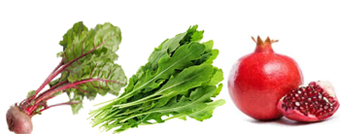Nitric oxide (NO) is a gas naturally produced in the endothelial cells, which line the inner walls of blood vessels. It is also produced in nerve cells and certain immune cells.

The body makes nitric oxide when enzymes convert nutrients like nitrates, L-arginine, or L-citrulline into nitric oxide, especially during exercise or in response to signals like low oxygen or increased blood flow.
Functions of Nitric oxide (NO)
Nitric oxide (NO) plays a critical role in relaxing blood vessels, improving circulation, and supporting heart health. When nitric oxide is released, it signals the smooth muscles around the blood vessels to relax. This relaxation lowers blood pressure and improves blood flow throughout the body. Better circulation means more oxygen and nutrients can reach the organs and muscles. This effect is especially important for heart function, brain health, and exercise performance.
Nitric oxide also helps prevent blood clotting and reduces inflammation, further protecting the blood vessels from damage.
What are the best ways to naturally boost nitric oxide levels?
✅ Beets are an excellent source because they’re rich in dietary nitrates, which the body converts into nitric oxide. Drinking beet juice or adding roasted beets to salads can help enhance nitric oxide production.
✅ Pomegranatesare another top food for this purpose, especially their juice, which contains compounds that support nitric oxide synthesis and prevent its breakdown. Studies have shown that just 1.5 ounces of pomegranate juice per day can significantly reduce high blood pressure.
✅ Leafy greens like spinach, arugula, beet greens, and kale are also high in nitrates and should be part of a nitric oxide-friendly diet.
✅ Regular physical activity can further stimulate nitric oxide production by increasing blood flow. Avoiding mouthwashes that kill beneficial oral bacteria is also important, as these bacteria help convert dietary nitrates into nitric oxide.
✅ Supplements like L-arginine and L-citrulline may also support nitric oxide production, but should be taken under medical guidance.
Keynote
Overall, a combination of nitrate-rich foods, regular exercise, and healthy lifestyle choices can naturally raise your nitric oxide levels and support cardiovascular health.

